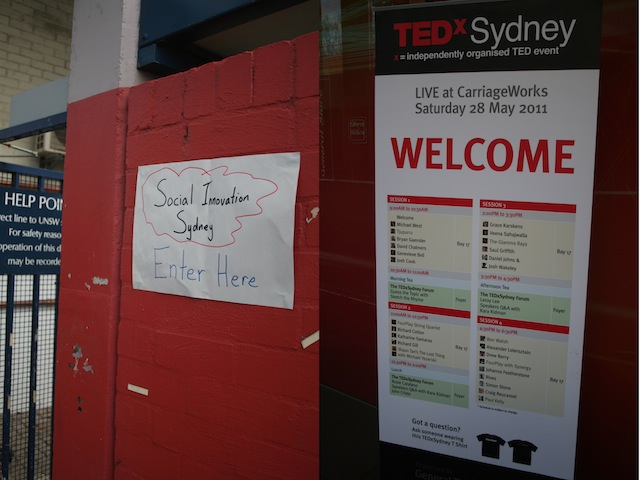Two conferences about ideas took place in Sydney last Saturday, TEDx Sydney and Social Innovation BarCamp. While both involved exploring concepts and thoughts they could not have been more different.
One was about exclusivity and elitism while the other was about a genuine exchange of ideas. Both the events tell us much about the new and old models of communication and learning.

At the Paddington College Of Fine Arts, Social Innovation Bar Camp – SIBSyd – was open to anyone with an idea or who just wanted to show up a throw some thoughts around. Across town at the Everleigh Carriageworks, the TEDx Sydney offshoot of the prestigious US TED event featured high profile speakers before an invitation only audience.

Most TED events are exclusive and restricted you have to be qualified to attend, let alone speak and this showed in the way the audience were ushered into the auditorium and then asked to turn off their mobile phones unless they wanted to sit in the back two rows.
The speakers at TED were slick, rehearsed and had their presentations timed exactly to the minute – as you’d expect at an event where the content is carefully chosen – while at SIBSyd any of the audience could choose to speak.
Even with a speaker everybody at a SIBSyd is able to participate, with all the audience of giving their views. In the reforming education session I sat in on a quiet lady at the back of the room told her experiences of working with villagers in Chiapas, Mexico.
It’s unlikely that lady would get an invite to TEDx, let alone have the opportunity to tell her story and that illustrates the fundamental difference between the two conferences.
One is the formal, traditional one-to-many lecture from an expert imparting wisdom on an audience awed by the speaker’s knowledge while the other sees the speaker – who may be an expert – drawing out the collective wisdom of the room.

The “unconference” structure of meetings like SIBSyd probably does a better job of developing new ideas as the traditional conference TED is based upon that assumes the expert on the stage already has the answers.
Of the two types of conferences, it’s probably safe to say the collaborative “unconference” model works better in driving innovative solutions to problems. To work effectively though it needs the participants to be motivated by common issues.
The traditional TED style conferences do a better job of getting big ideas across to a broader audience and that’s probably one of the reasons why the event’s videos have been such an Internet success.
Some of the differences reminded me of British writer Paul Carr’s comments about the South By South West Conference in 2009 when he said “I really hope that next year one or two of those early adopters will organise – and I mean that in the loosest sense – a user-generated unofficial fringe conference to sit alongside the main event.” In many ways SIBSyd was the fringe festival to TEDx’s “establishment” status.

Both have their role and probably the most worrying thing at the two events was the lack of Australia’s corporate and political leadership, with the exception of Penny Sharpe, MLC who appeared to be the sole member of Parliament attending TEDx, there was little representation from either group.
In a time of massive climate, technology and economic change that is challenging the assumptions and business models of previous generations, it’s a shame our business and political leaders aren’t engaging and listening to those outside their narrow circles.
But ideas are one thing and action is another. As journalist and enfant terrible Stilgherrian said during the day, “completely over events about ‘ideas’. We have plenty of ideas. What we need is a bit of effort put into execution.”
Hopefully out of both events we’ll see some of the ideas discussed turned into action

Leave a Reply